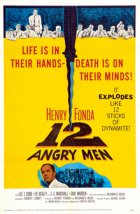
12 Angry Men Page #3
looked out, and saw the kid running down the stairs and out of the house. Then he called the police. They found
the father with a knife in his chest.
FOREMAN:
And the coroner fixed the time of death at around midnight.NO.3:
Right. Now what else do you want?NO. 4:
The boy's entire story is flimsy. He claimed he was at the movies. That's a little ridiculous, isn't it? Hecouldn't even remember what pictures he saw.
NO. 3:
That's right. Did you hear that? (To NO. 4) You're absolutely right.NO. 10:
Look, what about the woman across the street? If her testimony don't prove it, then nothing does.NO. 12:
That's right. She saw the killing, didn't she?FOREMAN:
Let's go in order.NO. 10:
(loud). Just a minute. Here's a woman who's lying in bed and can't sleep. It's hot, you know. (He getsup and begins to walk around, blowing his nose and talking.) Anyway, she looks out the window and right
across the street she sees the kid stick the knife into his father. She's known the kid all his life. His window is
right opposite hers, across the el tracks, and she swore she saw him do it.
NO. 8:
Through the windows of a passing elevated train.NO. 10:
Okay. And they proved in court that you can look through the windows of a passing el train at nightand see what's happening on the other side. They proved it.
NO. 8:
I'd like to ask you something. How come you believed her? She's one of "them" too, isn't she: I'd like to ask you something. How come you believed her? She's one of "them" too, isn't she?[NO. 10 walks over to NO. 8:]
NO. 10:
(sarcastically) You're a pretty smart fellow, aren't you?FOREMAN:
(rising) Now take it easy.[NO. 3 gets up and goes to NO. 10:]
NO.3:
Come on. Sit down. (He leads NO. 10 back to his seat.) What're you letting him get you all upset for?Relax.
[NO. 10 and NO. 3 sit down.]
FOREMAN:
Let's calm down now. Number. 5, it's your turn.NO. 5:
I’ll pass it.FOREMAN:
That's your privilege. (To NO. 6) How about you?NO.6:
(slowly). I don't know. I started to be convinced, you know, with the testimony from those people acrossthe hall. Didn't they say something about an argument between the father and the boy around seven o'clock that
night? I mean, I can be wrong.
NO.11:
I think it was eight o'clock. Not seven.NO. 8:
That's right. Eight o'clock. They heard the father hit the boy twice and then saw the boy walk angrily outof the house. What does that prove?
NO. 6:
Well, it doesn't exactly prove anything. It's just part of the picture. I didn't say it proved anything.FOREMAN:
Anything else?NO. 6:
No.[NO. 6 goes to the water fountain.]
FOREMAN:
(to NO. 7). All right. How about you?NO.7:
I don't know, most of it's been said already. We can talk all day about this thing, but I think we’rewasting our time. Look at the kid's record. At fifteen he was in reform school. He stole a car. He's been arrested
for mugging. He was picked up for knife-fighting. I think they said he stabbed somebody in the arm. This is a
very fine boy.
NO. 8:
Ever since he was five years old his father beat him up regularly. He used his fists.NO.7:
So would I! A kid like that.NO. 3:
You’re right. It's the kids. The way they are—you know? They don't listen. (Bitter) I've got a kid. Whenhe was eight years old, he ran away from a fight. I saw him. I was so ashamed, I told him right out, "I'm gonna
make a man out of you or I'm gonna bust you up into little pieces trying." When he was fifteen he hit me in the
face. He's big, you know. I haven't seen him in three years. Rotten kid! You work your heart out.... (Pause) All
right, let's get on with it.
3:
You’re right. It's the kids. The way they are—you know? They don't listen. (Bitter) I've got a kid. Whenhe was eight years old, he ran away from a fight. I saw him. I was so ashamed, I told him right out, "I'm gonna
make a man out of you or I'm gonna bust you up into little pieces trying." When he was fifteen he hit me in the
face. He's big, you know. I haven't seen him in three years. Rotten kid! You work your heart out.... (Pause) All
right, let's get on with it.
[Looks away embarrassed.]
NO. 4:
We're missing the point here. This boy—let's say he's a product of a filthy neighborhood and a brokenhome. We can't help that. We're not here to go into the reasons why slums are breeding grounds for criminals.
They are. I know it. So do you. The children who come out of slum backgrounds are potential menaces to
society.
NO. 10:
You said it there. I don't want any part of them, believe me.[There is a dead silence for a moment, and then NO. 5 speaks haltingly.]
NO. 5:
I've lived in a slum all my life.NO. 10:
Oh, now wait a second!NO. 5:
I used to play in a back yard that was filled with garbage. Maybe it still smells on me.FOREMAN:
Now let's be reasonable. There's nothing personal.[NO. 5 stands up.]
NO. 5:
There is something personal! [Then he catches himself and seeing everyone looking at him, sits down,fists clenched.]
NO. 3:
(persuasively). Come on, now. He didn't mean you, feller. Let's not be so sensitive.[There is a long pause.]
NO. 11:
I can understand this sensitivity.FOREMAN:
Now let's stop the bickering. We're wasting time. (To NO. 8) It's your turn.NO. 8:
All right. I had a peculiar feeling about this trial. Somehow I felt that the defense counsel never reallyconducted a thorough cross-examination. I mean, he was appointed by the court to defend the boy. He hardly
seemed interested. Too many questions were left unasked.
NO. 3 (annoyed). What about the ones that were asked? For instance, let's talk about that cute little switchknife.
You know, the one that fine, upright kid admitted buying.
NO. 8:
All right. Let's talk about it. Let's get it in here and look at it. I'd like to see it again, Mr. Foreman.[The foreman looks at him questioningly and then gets up and goes to the door. During the following dialogue
the foreman knocks; the guard comes in; the foreman whispers to him; the guard nods and leaves, locking the
door.]
NO. 3:
We all know what it looks like. I don't see why we have to look at it again. (To NO. 4) What do yo: We all know what it looks like. I don't see why we have to look at it again. (To NO. 4) What do youthink?
NO. 4:
The gentleman has a right to see exhibits in evidence.NO. 3:
(shrugging). Okay with me.NO. 4:
(to NO. 8). This knife is a pretty strong piece of evidence, don't you agree?NO. 8:
I do.NO. 4:
The boy admits going out of his house at eight o'clock after being slapped by his father.NO. 8:
Or punched.NO. 4:
Or punched. He went to a neighborhood store and bought a switch knife. The storekeeper was arrestedthe following day when he admitted selling it to the boy. It's a very unusual knife. The storekeeper identified it
and said it was the only one of its kind he had in stock. Why did the boy get it? (Sarcastically) As a present for
Translation
Translate and read this script in other languages:
Select another language:
- - Select -
- 简体中文 (Chinese - Simplified)
- 繁體中文 (Chinese - Traditional)
- Español (Spanish)
- Esperanto (Esperanto)
- 日本語 (Japanese)
- Português (Portuguese)
- Deutsch (German)
- العربية (Arabic)
- Français (French)
- Русский (Russian)
- ಕನ್ನಡ (Kannada)
- 한국어 (Korean)
- עברית (Hebrew)
- Gaeilge (Irish)
- Українська (Ukrainian)
- اردو (Urdu)
- Magyar (Hungarian)
- मानक हिन्दी (Hindi)
- Indonesia (Indonesian)
- Italiano (Italian)
- தமிழ் (Tamil)
- Türkçe (Turkish)
- తెలుగు (Telugu)
- ภาษาไทย (Thai)
- Tiếng Việt (Vietnamese)
- Čeština (Czech)
- Polski (Polish)
- Bahasa Indonesia (Indonesian)
- Românește (Romanian)
- Nederlands (Dutch)
- Ελληνικά (Greek)
- Latinum (Latin)
- Svenska (Swedish)
- Dansk (Danish)
- Suomi (Finnish)
- فارسی (Persian)
- ייִדיש (Yiddish)
- հայերեն (Armenian)
- Norsk (Norwegian)
- English (English)
Citation
Use the citation below to add this screenplay to your bibliography:
Style:MLAChicagoAPA
"12 Angry Men" Scripts.com. STANDS4 LLC, 2025. Web. 23 Feb. 2025. <https://www.scripts.com/script/12_angry_men_58>.







Discuss this script with the community:
Report Comment
We're doing our best to make sure our content is useful, accurate and safe.
If by any chance you spot an inappropriate comment while navigating through our website please use this form to let us know, and we'll take care of it shortly.
Attachment
You need to be logged in to favorite.
Log In